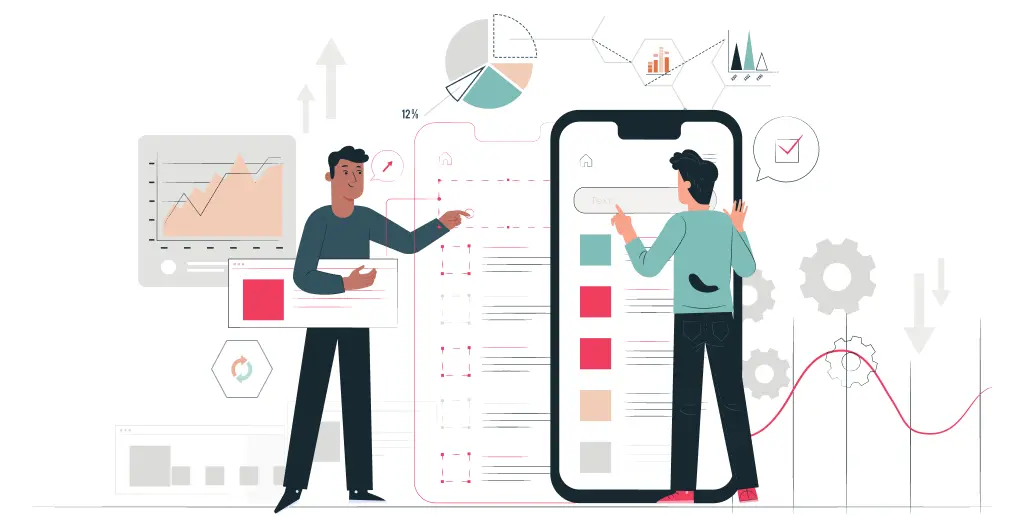With every business developing mobile applications to serve consumers, there is an urgent need to stay current with fast-changing industry trends, technological advancements, and customer demands.
Allowing data to drive your decisions is a sure-fire method to outperform the competition and achieve success.
And Big Data will help you unleash hidden trends and consumer preferences, which you can use to build cutting-edge mobile app development services.

What Is Big Data?
Machines, people, and tools contribute to the diverse and dynamic volume of data and information generated in our digital era. And such a data giant needs enhanced, cutting-edge, creative, secure, and scalable technology for data collection, analytics, and hosting.
And Big Data technologies handle such data. As a result, Big Data produces accurate and insightful business insights about profit, users, productivity management, performance, risk, and increased shareholder value.
The critical aspect in the realm of Big Data is performance and flexibility. It readily incorporates real-time data and information.
And whether it’s an entertainment, utility, social networking, or gaming app, data analytics is powering behind-the-scenes growth in an already thriving sector.
Amazon, Starbucks, American Express, Capital One, and Netflix are just a few businesses reaping the advantages of Big Data analysis and offering their consumers improved services previously unachievable with traditional analytics.
8 Ways Big Data Affects Mobile Application Development
Here’s how Big Data is used effectively in the mobile app development process:
1- Gain Insights
The core function of Big Data is to collect and systematically extract significant data sets to be understood and studied in more detail later. These analytics are advantageous for mobile marketing since they provide marketers with immediate insight into their clients’ behavior. It enables them to rapidly and efficiently develop targeted communications, therefore increasing their downloads and exposure
2- Better Gaming Environment
In today’s mobile gaming environment, Big Data is used to forecast a user’s playing behavior to recommend games they are likely to love, improving the experience and significantly boosting the chance of continuing involvement. A real-world example of this may be seen in the online casino business, particularly mobile slot games.
3- Understand Customer Demands
A mobile app development company doesn’t just make an excellent mobile app visually appealing if it does not satisfy the demands of its consumers. By gaining a knowledge of how users of all backgrounds, ages, lifestyles, and geographies relate to, respond to, and engage with mobile applications, you may develop new and creative apps and enhance the capabilities of current ones.
4- Drive User Experience
By leveraging Big Data, you can undertake in-depth user experience research, obtain a 360-degree picture of usage and the user experience, assess engagement for each feature or page, and identify the most desired features and pain areas. You may then use this data to compile a list of the features that consumers want, prepare for design adjustments or revisions, enhance the user experience, and increase engagement.
5- Access to Real-time Data
Businesses nowadays must be abreast of shifting trends to stay competitive. Big Data is critical for staying current. By reviewing real-time data, you may make data-driven decisions in real-time to increase client happiness and profit.
6- Create Marketing Strategies
With a database of user behavior data, such as their likes, dislikes, wants, and expectations, you can develop the most effective marketing plans for how, when, and where to target your audience. As a result, you can make more informed judgments on various topics with various mobile app development tools, including the push notifications to send and the approach you utilize to increase engagement.
7- Enable Personalization
By analyzing data from customer inquiries, you can prioritize results and provide more contextually relevant experiences to the users who care the most about them. Additionally, you may group data and functionality to create more inventive self-service for instant responses. For instance, Amazon leverages Big Data to do predictive research and provides product recommendations based on users’ prior purchases, goods seen or liked, and trending products. As a result, Amazon delivers the most relevant items and a tailored shopping experience to each consumer by integrating suggestions throughout the purchase cycle – from product discovery through checkout.
8- Drive Revenue
Today, the mobile app has evolved into the focal point of all communication initiatives for businesses operating in an increasingly mobile environment. As a result, the mobile application industry is expected to reach $189 billion by 2020. Although millions of companies worldwide develop mobile applications daily, you can optimize app performance and increase user engagement via technologies such as Big Data.
In conclusion, the benefits of data analytics extend across a wide range of sectors and organizations. It leverages real-time data to deliver tailored experiences that are most successful at meeting consumers’ demands.
If mobile is a critical component of your go-to-market strategy, it’s past time you leverage Big Data to develop practical and revenue-generating mobile applications. Still, there is an excellent chance for development and innovation in the mobile space. With the advancement of mobile app development technology, the sky’s the limit for analytical solutions.